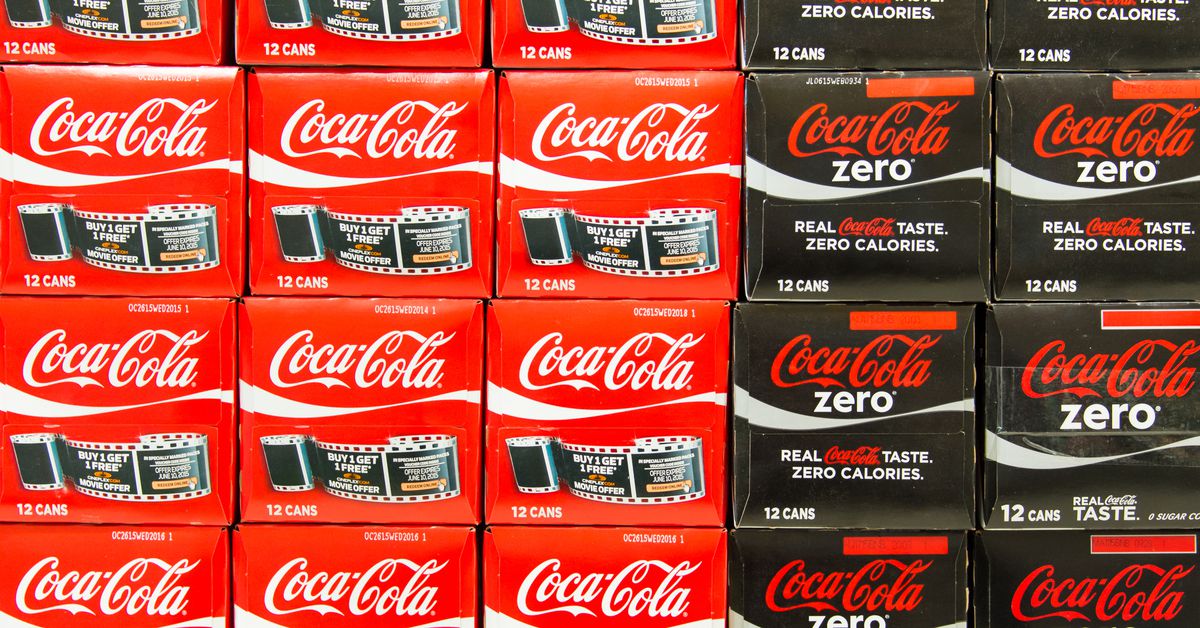There is a lot of public misunderstanding of the rodent studies that linked aspartame to cancer, which are very flawed and essentially come from a single Italian research group.
There is still no definitive link to cancer risk in humans so I would continue to be skeptical. The maximum recommended safe exposure for aspartame is the equivalent of 12 cans of coke, and the strong effects from the rodent study were using exposure amounts equivalent to 5 times that amount, or 60 cans daily, every day of their life after day 12 of fetal life (i.e. before birth).
Almost anything can cause long-term health risks and toxicity at such massive exposure levels.
https://www.cancer.org/cancer/risk-prevention/chemicals/aspartame.html
Link to the free Pubmed link to one of the original source studies from 2008 so you can see their methodology and the absurdly massive exposure amounts needed to ovserve these effects:
the strong effects from the rodent study were using exposure amounts equivalent to 5 times that amount, or 60 cans daily, every day of their life after day 12 of fetal life (i.e. before birth).
This is why I hate rodent studies. They always up the exposure to whatever they are testing to hyper-extreme limits. Then point their flawed results to the world and declare “See! X causes Y!”
There are even similar rat studies for marijuana that try to link it to cancer as well, despite the fact that zero people have actually died from weed. It’s all overblown bullshit.
Dude have you seen how many diet Cokes people drink? Liters and liters daily. Not excessive at all honestly considering LifeTime total exposure
Im a chemist by trade. This is actually chemically very simple. I only looked deeply into Sucralose Splenda. So I’ll discuss that
These have Chlorine molecules. A very electrophilic element even in a chemical bond. Meaning it can cause reactions in other molecules very easily. Sucralose has Three Chlorines. If it touches DNA it’s bad business man.
I love diet Coke btw lol I could drink 5 gallons right now idk I smoke cigs. But don’t sugar coat it
Table salt has more chlorine by mass than sucralose. Moreover, in your body, table salt dissociates into a chlorine ion, whereas in sucralose it’s covalently bonded into the molecular structure. That’s not to say that it is suddenly nonreactive, but being covalently bonded tempers some of it’s electron craving, so to speak. By your logic, table salt should be orders of magnitude more dangerous than sucralose (it’s not).
Edit to add: Do you know of any mechanism by which sucralose could cross the nuclear membrane? If not, sucralose isn’t going to be touching DNA at all. It could touch some form of RNA in the cytoplasm, which isn’t necessarily innocent, but it’s not going to be touching the DNA. That means it won’t cause long-term genetic changes or damage; any damage it caused would be transitory to the working set of RNA and that damage would be gone when that RNA was processed/destroyed.
You are saying that sucralose (or a metabolite thereof) could alkylate DNA - and theoretically proteins too - correct? Like what sulfur mustard gas does?
I did a quick search and couldn’t find any papers demonstrating a mechanism of action for that, although I skimmed a few that postulated that a dichlorinated hydrolysis product might be the true carcinogenic agent. Do you know of any studies that demonstrate that the alkylation can happen, either in vitro or (ideally) in vivo? Or maybe some better search terms to use, that could be my issue…
I am truly curious about this, I never knew the chemical structure of sucralose until I read your comment and subsequently looked it up.
I disagree with the ‘massive’ exposure ‘needed’ to observe these effects exaggeration. First, the point of the study was to show it can be carcinogenic, not to parse at exactly what level in humans. Second, effects are seen at the 400ppm level which equates to 20mg/kg. This is 1600mg/day or 8 cans of Diet Coke (@200mg/can) for an 80kg male. That is NOT an impossible level of daily consumption for many.
I suspect further research was done to confirm your linked studies and refine exactly at what minimum levels of daily consumption elicit carcinogenic effects. That will likely be in the full report once released. Until then, you sound like you don’t want it to be true, rather than an impartial evaluator of the research.
Apple seeds can kill you in large enough quantities
Found the cigarette smoker
the point of the study was to show it can be carcinogenic
Almost anything can be carcinogenic with a high enough exposure. You can pump a rat full of water until it dies and declare that water kills people. But, that doesn’t prove anything or serve a point.
Second, effects are seen at the 400ppm level which equates to 20mg/kg. This is 1600mg/day or 8 cans of Diet Coke (@200mg/can) for an 80kg male. That is NOT an impossible level of daily consumption for many.
In rats! You can’t just multiple a rat study by body weight and expect it to always correlate. That’s why studies are done in larger animals, and sometimes the concept just dies there.
A single study is a statistic. Until they duplicate the results multiple times, and upgrade to monkeys, pigs, or (in a safe way) humans, this is all just noise.
Almost anything can be carcinogenic with a high enough exposure. You can pump a rat full of water until it dies and declare that water kills people.
It would lead to death, but not to cancer. Not everything is carcinogenic, even with high exposure. Causing death by a method other than cancer doesn’t make it carcinogenic.
Almost anything can be carcinogenic with a high enough exposure. You can pump a rat full of water until it dies and declare that water kills people. But, that doesn’t prove anything or serve a point.
This is how science is done friend. You make no assumptions. You have reason to believe a theory predicts a testable outcome? You test it. Not everything causes cancer. Pure air doesn’t… Clean water doesn’t… The research shows us Aspartame does indeed have carcinogenic effects in rats. Now we know this, and the result can be used to support applications for more costly research using subjects much more similar to our anatomy because if it is carcinogenic in one mammal, it probably is carcinogenic in others.
You call the study flawed when it looks perfectly fine to me for the purpose it was designed for. It shows it is carcinogenic in the mammal it was tested on at dosage levels that translate to non-‘massive’, quite reasonable consumption rates for humans. As such, it warrants concern and all these claims by the European and US Food Agencies saying ‘we did 100s of studies decades ago and it is fine trust me bro’ is not enough. I’m not arguing this one study proves Aspartame causes cancer in humans. I’m saying your particular criticisms of it are unfounded as is your confidence that Aspartame is non-carcinogenic. You cite FDA claims ‘Aspartame is safe’ but show no research that supports this conclusion. Looking at the provided links I noticed things like “don’t feed to pregnant mothers because phenylalanine”, “methanol is a metabolite - nothing concerning there”, and ‘we plan on doing a systemic revaluation of aspartame as the research is over a decade old (the whole time with the biggest corporations in the world breathing down our necks)’ https://www.efsa.europa.eu/sites/default/files/corporate_publications/files/factsheetaspartame.pdf
Looks to me like somebody did more research and found contradictory results otherwise why would WHO say they are going to do this?
You cite FDA claims ‘Aspartame is safe’ but show no research that supports this conclusion. Looking at the provided links I noticed things like “don’t feed to pregnant mothers because phenylalanine”, “methanol is a metabolite - nothing concerning there”, and ‘we plan on doing a systemic revaluation of aspartame as the research is over a decade old (the whole time with the biggest corporations in the world breathing down our necks)’ https://www.efsa.europa.eu/sites/default/files/corporate_publications/files/factsheetaspartame.pdf
I do? Which post do I claim anything? What links did I provide?
My whole point is that one flawed study with rats doesn’t prove a damn thing, and is not enough to make a decision on.
I’m going to agree with Burstar here - if you’re setting out to prove that something is possible, you’re going to give it the best chance you can. Once you know its possible (whether its something like using an arduino to simulate an old price of hardware, or if a compound can cause cancer), you go and refine it down.
Hello Cocacola CEO
Misleading title. They’re about to declare it as possibly cancerous. Not fully cancerous. And if anything this is just to get even more research into it.
Aspartame is in a lot of things, mainly sodas and gum, but you’d have to consume a lot of the stuff beyond a human limit really.
I do think this may put a dent in sugar free products assuming it gets declared as such.
They’re about to declare it as possibly cancerous. Not fully cancerous.
What do you mean by this? Everything that can cause cancer is declared “possibly cancerous”; it depends on dose and exposure. Nothing is “fully cancerous” for whatever that might even mean. You can be exposed to radiation and either get cancer or not; it depends on the dose. Would you call radiation “possibly cancerous”, or “fully cancerous”?
Analagously, most bacteria can cause infections but they don’t always in everyone. So to label a bacteria as purely benign or purely dangerous is just as silly as trying to make a distinction between “possibly cancerous” and “fully cancerous”.
Aspartame is in a lot of things, mainly sodas and gum, but you’d have to consume a lot of the stuff beyond a human limit really.
And if someone wants to minimize their risk of cancer, they should be able to make informed decisions. Knowing that at particular food-additive has higher-than-baseline chances of causing cancer allows someone with a different risk-aversion profile to make decisions wisely. If you don’t mind the incidence rate at the dose you consume it at, that’s fine as well. But it is useful to have it be public knowledge if something is potentially cancer-causing.
The difference between “possibly cancerous” and “fully cancerous” is that the former is not confirmed to have the property of causing cancer.
Radiation on the other hand is known to be carcinogenic.
To use your analogy, we know that there are bacteria that cause infections and bacteria that are harmless to humans. Let’s say we have bacteria A that is known to cause infection but not always in everyone. Then we have a bacteria B, which is potentially able to cause infection. We don’t know for certain that it can, but we also don’t know that it can’t.
And yes, it’s a pretty fucking useless designation, and WHO is wasting everyone’s time and causing undue panic. Let’s not forget how they completely fucked the world with their atrocious handing of Covid in the early stages of the outbreak.
It means that Aspartame is going to be added to the “Group 2B” classification list. It’s worth noting that “Red Meat” and “Alcohol” are in the much more severe “Group 1” list, so you should probably give up steak and beer before you ditch your favorite diet soda.
There’s different classes of cancer-causing compounds. Alcohol, for example, has the highest classification, meaning there is indisputable evidence exposure increases the risk of certain cancers. Then you have decreasing strength of evidence from there.
There’s a scale. I wouldn’t put aspartame on the same level as smoking for it’s chances of causing cancer. That’s what i mean. I guess “fully Cancerous” isnt really a good way of putting it into words.
It doesn’t outright cause cancer like the title implies. By saying it causes cancer in the title is misleading. There’s very little evidence that supports that, and I see them only doing this considering the concerns around it and more research.
I’m absolutely for people knowing this information and making informed decisions if they want to stay away from it or keep using it. That’s all on them.
Should’ve titled it something more like “WHO is about to rule aspartame as ‘possibly cancerous.’ Here’s what that tells you”
I don’t think you can put “the” before WHO unless Roger Daltrey approves it.
I worry about a lot of the additives used today. Some products will say “no sugar added” but will include some artificial sweetener that you only see in the fine print.
I worry about the “natural” sugar alternatives. We all know that aspartame is safe, it’s been researched about as extensively as it can be. It only starts to be a concern when you’re drinking 2 dozen diets sodas daily.
But people give “natural” a pass for some reason.
Natural is always good, my cereal has natural uranium for a spicy natural alternative to sugar. It’s totally safe.
(For legal purposes, this comment is a joke)
Which is no sugar. So wheres the Problem?
I don’t like it when my tea is sweet :(
So then buy unsweetened tea. We already have a term for things that aren’t sweet.
https://www.amazon.com/Pure-Leaf-Unsweetened-Brewed-Calories/dp/B015Z6WJDY/
I seriously don’t understand why you want the “no sugar added” label to have factually incorrect requirements.
I want flavored tea that doesn’t have sweet but all the bottles are sweet :(
Them’s fighin’ words
-the entire state of NC
Like how cancerous is it? Considering the amount of diet pop my family consumes…I’m kinda worried
I’m pretty sure the last I read about this it was an absurd concentration that showed to potentially cause cancer. Nothing a human could drink in such concentrations.
That being said maybe that’s changed very very recently, I’ll be interested to see what their actual findings are.
A lot of things potentially cause cancer in huge concentrations.
Edit - From what I’ve read aspartame would be considered a possible carcinogen in the same class of Coffee. That doesn’t make quite the same headline though hah!
Like the sun.
Less cancerous than bacon, alcohol, or Canadian air.
Not gonna preach or anything but that stuff is trash. You guys should quit honestly. I “reset” my tastes to less sweet stuff over time and it’s incredible how different things taste after you lose the expectations they should be sweet to be delicious.
I eat my morning oats with unsweetened soy milk and cow’s milk now tastes like candy to me.
Yeah seriously it’s nuts how used to sugar we get
Aspartame has been in common usage as a sugar alternative for literally decades.
If it was harmful or potent enough to be dangerous on a public or individual health risk then we would have certainly known about it by now. At this stage, even WHO, are saying it’s needed in HUGE concentrations.
Diet sodas aren’t the only things that we consume that contains aspartame. And aspartame isn’t the only thing we’re exposed to that has been linked to cancer and other deseases.
Just get on with life, enjoy what you enjoy in moderation. Don’t put too much thought into it otherwise you’ll just end up living in fear and avoiding everything.
Not cancerous whatsoever. It’s approved for use worldwide and it’s one of the most studied additives on the planet.
It has been massively consumed worldwide for many decades, without causing any statistically noticeable increase in cancer rates.
Considering the incredibly negative health impact of sugary drinks, artificial sweeteners probably prevented millions of deaths over the decades they have been used.
Like the other “scary” “it causes cancer” studies, they probably stuffed a rat with its body weight of aspartame and when it developed cancer they figured it’s carcinogenic.
Completely disregarding that a can of artificially sweetened coke will have less than 1g of aspartame, which is 0.0002% of average human’s bodyweight.
Don’t panic until the report officially locked out. We are very certain that smoking and pork cause cancer, but smoking has a huge possibility of lung cancer while pork only increases your chances of cancer by something like 20%. This could be one of those “We are 99.999% certain that it increases your risk by 10%” sort of things.
Same here. My wife and I only really drink water but her stepdad got bladder cancer after decades of drinking nothing but Budweiser and diet dew. He’s cancer free now but lost his bladder and prostate.
Faaar less than red meat, alcohol and spending time in the Sun.
At most 1.15 x risk. Bigger effects are on risk for diabetes, heart disease and metabolic syndrome. By itself aspartame doesn’t appear to be too bad. But it causes sugar craving which can lead to excessive and poor eating habits.
I could be wrong, and I’m too lazy to Google at the moment, but I swore this was made public information long ago. When I was young, aspartame was being phased out in favor of sucralose. I recall hearing stories about aspartame being banned in other countries as a child.
For anyone who likes diet soda, check out Zevia. It’s sweetened with Stevia instead of aspartame. Doesn’t taste too bad either. Makes a great vodka mixer since it’s 0 calories.
Unfortunately I’ve never tasted anything with Stevia that I like. Weird, weird aftertaste.
Aspartame has an aftertaste but I got used to it after maybe three tries. I’ve never gotten used to Stevia.
Too bad, because in other ways Stevia is superior.
I like fizzy drinks, so lately I’ve been mostly drinking unsweetened, like La Croix or Spindrift.
this guy always gives some good context for this kind of sensational diet/health claim: https://proxitok.pussthecat.org/@roblapham/video/7252049382957255942
Great video, thanks for sharing.
Removed by mod
Fat people in shambles
No they aren’t. There’s no substantial proof for it, and the body of people who are behind this label (IARC) aren’t even a food safety body. They once tried to say eating red meat is “possibly” cancer-causing as well.
They once tried to say eating red meat is “possibly” cancer-causing as well.
Because it is. Whether the effect size is significant to you or not is one thing, but there is good evidence that it has a nonzero effect. Which is similarly the case here: there is evidence of effect of aspartame, but whether the effect size is significant is up to you to decide (or legislators).
Also causes memory lose.
For those that downvote because you didn’t want to do so basic research. Here https://www.amenclinics.com/blog/can-diet-soda-increase-the-chances-of-dementia/#:~:text=Aspartame overstimulates neurotransmitters.,as learning and pain perception.
But again this is one source. There are others first heard about it from Reddit. But I also have first hand knowledge of the effects because my brother and father were heavy drinkers of the stuff and definitely effected their memories.
Find me one source that shows evidence of that.
Source: just trust me bro
Well I had the source right here, but then I drank a diet coke so…
Can Diet Soda Increase the Chances of Dementia? June 12, 2019
Share:
Can Diet Soda Increase the Chances of Dementia The artificial sweeteners used in diet sodas—and thousands of other processed foods—are anything but sweet. In fact, they can be toxic to the brain. Consuming these sugar substitutes on a regular basis is not a recipe for a healthy memory.
Sherry, who weighed over 200 pounds on her 5’5” frame, guzzled diet soda thinking it would help her lose weight. It didn’t. Even worse, she started experiencing a host of symptoms—digestive issues, arthritis, forgetfulness, and confusion. In fact, Sherry’s diet soda habit was hurting her brain and putting her memory at risk.
That’s what a growing body of evidence shows. For example, a study in the journal Stroke found that drinking diet soda was linked to an increased risk of Alzheimer’s disease and other forms of dementia.
4 Ways Artificial Sweeteners Steal Your Mind
- Aspartame overstimulates neurotransmitters. One of the most commonly used artificial sweeteners in diet sodas, aspartame is particularly damaging to the brain. Consider how it impacts aspartate, an excitatory neurotransmitter associated with memory as well as learning and pain perception. Aspartame stimulates this neurotransmitter. This may sound like a good thing, but in excessive amounts it overstimulates it, turning it into a potent neurotoxin that damages neurons, causes cell death, and is associated with a host of issues including memory problems and dementia.
Also my brother and dad were heavy drinkers of diet Coke I saw first hand experience of ut affecting their memory. With my dad we literally thought he had dementia. Then we cut it off and over time he got better.
Anecdotes and junk science
Then do you research because its out there and it’s a fact. Scientists are just discovering it.
Do your reasearch? People have been researching for decades.
The 2nd point in the blog post you present as a source is factually incorrect:
- Artificial sweeteners contribute to chronically high insulin.
The link (bolded by me) in the following text
One of the most commonly used artificial sweeteners in diet sodas, aspartame is particularly damaging to the brain.
Goes to a page titled “Can Sugar Affect Your Cognitive Ability?”. They didn’t even link to the thing their text is claiming.
How can you take this trash seriously?
And personal anecdotes are absolutely worthless in discussions like this. Artificial sweeteners are consumed by a massive portion of the population. Any person who falls ill is likely to have consumed artifical sweeteners, so they will have incredible correlation with every disease on the planet.
Ah yes the noted scientific journal amenclinics.com/blog
Unassailable source there, bud.
But he knows 2 people who drank some diet soda and later had memory issues! You can’t dispute those numbers!

















